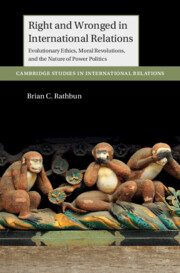 Right and Wronged in International Relations
Right and Wronged in International Relations Book contents
- Right and Wronged in International Relations
- Reviews
- Cambridge Studies in International Relations: 163
- Right and Wronged in International Relations
- Copyright page
- Dedication
- Contents
- Figures
- Tables
- Acknowledgments
- 1 The Nature in and Nature of International Relations
- 2 Lesser Angels
- 3 Mankind Is What Anarchy Makes of It
- 4 See No Evil, Speak No Evil?
- 5 To Provide and to Protect
- 6 Just Desserts in the Desert
- 7 Barking Dogs and Beating Drums
- 8 Biting the Bullet
- 9 Dying in Vain
- 10 Daily Bread
- 11 From Demonizing to Dehumanizing
- Index
- Cambridge Studies in International Relations: 163
4 - See No Evil, Speak No Evil?
Cross-National Micro- and Macrofoundational Evidence of Morality’s Ubiquity
Published online by Cambridge University Press: 29 July 2023
- Right and Wronged in International Relations
- Reviews
- Cambridge Studies in International Relations: 163
- Right and Wronged in International Relations
- Copyright page
- Dedication
- Contents
- Figures
- Tables
- Acknowledgments
- 1 The Nature in and Nature of International Relations
- 2 Lesser Angels
- 3 Mankind Is What Anarchy Makes of It
- 4 See No Evil, Speak No Evil?
- 5 To Provide and to Protect
- 6 Just Desserts in the Desert
- 7 Barking Dogs and Beating Drums
- 8 Biting the Bullet
- 9 Dying in Vain
- 10 Daily Bread
- 11 From Demonizing to Dehumanizing
- Index
- Cambridge Studies in International Relations: 163
Summary
In this chapter, with Caleb Pomeroy, I take a number of theories from moral and social psychology grounded in evolutionary claims and show that they illuminate critical components of international relations and foreign policy behavior. First, it is almost impossible to talk about threat and harm without invoking morality. Second, state leaders and the public will use moral judgments as a basis, indeed the most important factor, for assessing international threat, just as research shows they do at the interpersonal level. We test the first claim using a word embeddings analysis of several large textual corpora. Whether it be speeches before the United Nations or private deliberations of American foreign policy officials, when policymakers and politicians talk about harm and threat, they simultaneously use words indicating judgments about immorality in the same way that everyday citizens do. The second claim rests on Fiske’s “warmth-competence” model, which identifies moral characteristics as the most important criteria by which we form our impressions of others. An original survey experiment on the Russian public shows we do the same with nation-states. We buttress these findings by analyzing two observational surveys of Chinese respondents and another three survey experiments with Russian and American respondents.
- Type
- Chapter
- Information
- Right and Wronged in International RelationsEvolutionary Ethics, Moral Revolutions, and the Nature of Power Politics, pp. 98 - 127Publisher: Cambridge University PressPrint publication year: 2023
